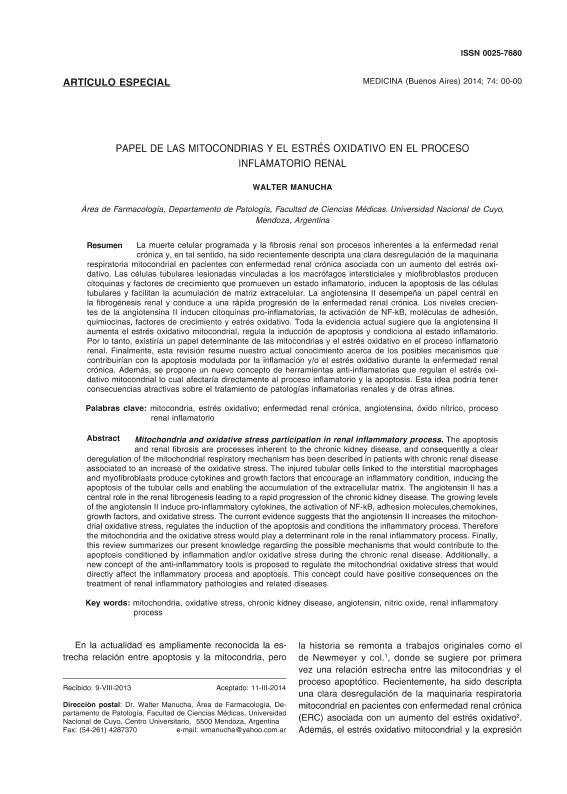Mostrar el registro sencillo del ítem
dc.contributor.author
Manucha, Walter Ariel Fernando

dc.date.available
2016-12-14T15:46:57Z
dc.date.issued
2014-06
dc.identifier.citation
Manucha, Walter Ariel Fernando; Mitochondria and oxidative stress participation in renal inflammatory process; Medicina (buenos Aires); Medicina (buenos Aires); 74; 3; 6-2014; 254-258
dc.identifier.issn
0025-7680
dc.identifier.uri
http://hdl.handle.net/11336/9347
dc.description.abstract
La muerte celular programada y fibrosis renal son procesos inherentes a la enfermedad renal crónica, y en tal sentido ha sido recientemente descripto, una clara desregulación de la maquinaria respiratoria mitocondrial en pacientes con enfermedad renal crónica asociada con un aumento del estrés oxidativo. Las células tubulares lesionadas vinculadas a los macrófagos intersticiales, y miofibroblastos producen citoquinas y factores de crecimiento que promueven un estado inflamatorio, inducen la apoptosis de las células tubulares y facilitan la acumulación de matriz extracelular. La angiotensina II desempeña un papel central en la fibrogénesis renal y conduce a una rápida progresión de la enfermedad renal crónica. Los niveles crecientes de la angiotensina II inducen citoquinas pro-inflamatorias, la activación de NF-kB, moléculas de adhesión, quimiocinas, factores de crecimiento, y el estrés oxidativo. Toda la evidencia actual sugiere que angiotensina II aumenta el estrés oxidativo mitocondrial, regula la inducción de apoptosis y condiciona al estado inflamatorio. Por lo tanto, existiría un papel determinante de las mitocondrias y el estrés oxidativo en el proceso inflamatorio renal. Finalmente, esta revisión resume nuestro actual conocimiento acerca de los posibles mecanismos que contribuirían con la apoptosis modulada por la inflamación y/o el estrés oxidativo durante la enfermedad renal crónica. Además, se propone un nuevo concepto de herramientas anti-inflamatorias que regulan el estrés oxidativo mitocondrial lo cual afectaría directamente al proceso inflamatorio y la apoptosis. Esta idea podría tener consecuencias atractivas sobre el tratamiento de patologías inflamatorias renales y de otras afines.
dc.description.abstract
Mitochondria and oxidative stress participation in renal inflammatory process. The apoptosis and renal fibrosis are processes inherent to the chronic kidney disease, and consequently a clear deregulation of the mitochondrial respiratory mechanism has been described in patients with chronic renal disease associated to an increase of the oxidative stress. The injured tubular cells linked to the interstitial macrophages and myofibroblasts produce cytokines and growth factors that encourage an inflammatory condition, inducing the apoptosis of the tubular cells and enabling the accumulation of the extracellular matrix. The angiotensin II has a central role in the renal fibrogenesis leading to a rapid progression of the chronic kidney disease. The growing levels of the angiotensin II induce pro-inflammatory cytokines, the activation of NF-kB, adhesion molecules,chemokines, growth factors, and oxidative stress. The current evidence suggests that the angiotensin II increases the mitochondrial oxidative stress, regulates the induction of the apoptosis and conditions the inflammatory process. Therefore the mitochondria and the oxidative stress would play a determinant role in the renal inflammatory process. Finally, this review summarizes our present knowledge regarding the possible mechanisms that would contribute to the apoptosis conditioned by inflammation and/or oxidative stress during the chronic renal disease. Additionally, a new concept of the anti-inflammatory tools is proposed to regulate the mitochondrial oxidative stress that would directly affect the inflammatory process and apoptosis. This concept could have positive consequences on the treatment of renal inflammatory pathologies and related diseases.
dc.format
application/pdf
dc.language.iso
spa
dc.publisher
Medicina (buenos Aires)

dc.rights
info:eu-repo/semantics/openAccess
dc.rights.uri
https://creativecommons.org/licenses/by-nc-sa/2.5/ar/
dc.subject
Mitocondria
dc.subject
Angiotensina
dc.subject
Vitamina D
dc.subject
Enfermedad Renal
dc.subject
Mitochondria
dc.subject
Oxidative Stress
dc.subject
Chronic Kidney Disease
dc.subject
Angiotensin
dc.subject
Nitric Oxide
dc.subject
Renal Inflammatory Process
dc.subject.classification
Patología

dc.subject.classification
Medicina Básica

dc.subject.classification
CIENCIAS MÉDICAS Y DE LA SALUD

dc.title
Mitochondria and oxidative stress participation in renal inflammatory process
dc.title
Mitochondria and oxidative stress participation in renal inflammatory process
dc.type
info:eu-repo/semantics/article
dc.type
info:ar-repo/semantics/artículo
dc.type
info:eu-repo/semantics/publishedVersion
dc.date.updated
2016-12-07T18:01:58Z
dc.identifier.eissn
1669-9106
dc.journal.volume
74
dc.journal.number
3
dc.journal.pagination
254-258
dc.journal.pais
Argentina

dc.journal.ciudad
Buenos Aires
dc.description.fil
Fil: Manucha, Walter Ariel Fernando. Consejo Nacional de Investigaciones Científicas y Técnicas. Centro Científico Tecnológico Mendoza. Instituto de Medicina y Biología Experimental de Cuyo; Argentina. Universidad Nacional de Cuyo. Facultad de Ciencias Médicas. Departamento de Patología; Argentina
dc.journal.title
Medicina (buenos Aires)

dc.relation.alternativeid
info:eu-repo/semantics/altIdentifier/url/http://ref.scielo.org/zv784h
Archivos asociados
